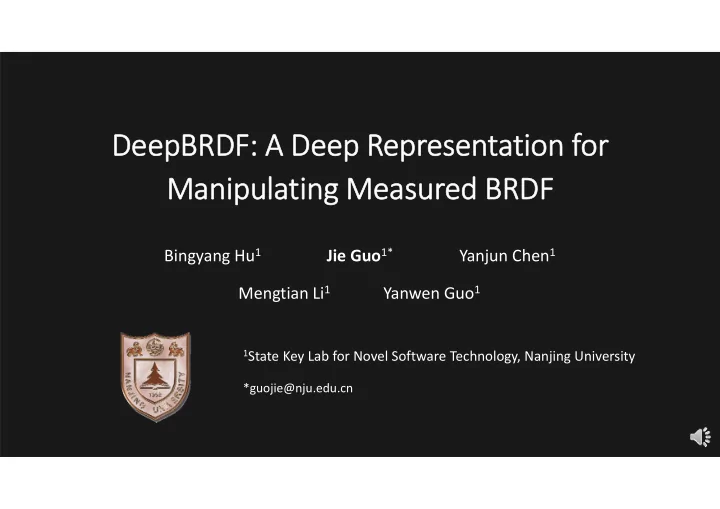

DeepBRDF: A Deep Representation for Manipulating Measured BRDF Bingyang Hu 1 Jie Guo 1* Yanjun Chen 1 Mengtian Li 1 Yanwen Guo 1 1 State Key Lab for Novel Software Technology, Nanjing University *guojie@nju.edu.cn
Material Apperance + Material
General Reflectance Function • A real material’s surface reflectance function is a very complex function of 16 variables. general reflectance function (GRF)
Taxonomy
BRDF • Bidirectional Reflectance Distribution Function • BRDF 𝑔 � describes surface reflection at a point 𝑦 for light incident from direction 𝜕 � � 𝜄 � , 𝜒 � reflected into direction 𝜕 � � 𝜄 � , 𝜒 �
Material Apperance Raymond et al. – Multi‐Scale Rendering of Scratched Materials using a Structured SV‐BRDF Model. 2016 stanschaap.com
Material Apperance Heitz et al. ‐ Multiple‐Scattering Microfacet BSDFs with the Smith Model, SIGGRAPH 2016
Material Apperance Vincent Schussler et al. ‐ Microfacet‐based normal mapping for robust Monte Carlo path tracing, SIGGRAPH Asia 2017
Material Apperance Yan et al. –Rendering Specular Microgeometry with Wave Optics, SIGGRAPH 2018
BRDF Acquisition Qimaging Retiga 1300 (10‐bit 1300x1300 lamp firewire camera) sample controlled turntable Physically Based Rendering ‐ Jie Guo 2020/10/29
Measured BRDF UTIA BRDFs MERL BRDFs
Measured BRDF
Measured BRDF ‐ Memory footprint + Accurate ‐ Computational cost Reduce the dimensionality
Related Work A data‐driven reflectance model [Matusik 2003]
Related Work On Optimal, Minimal BRDF Sampling A data‐driven reflectance model for Reflectance Acquisition [Matusik 2003] [Nielsen 2015](IPCA)
Related Work On Optimal, Minimal BRDF Sampling A data‐driven reflectance model for Reflectance Acquisition [Matusik 2003] [Nielsen 2015](IPCA) An intuitive control space for material appearance [Serrano et.al 2016]
Related Work On Optimal, Minimal BRDF Sampling A data‐driven reflectance model for Reflectance Acquisition [Matusik 2003] [Nielsen 2015](IPCA) An intuitive control space for Connecting measured brdfs to analytic brdfs material appearance by data‐driven diffuse‐specular separation. [Serrano et.al 2016] [Sun et.al 2018]
Related Work On Optimal, Minimal BRDF Sampling A data‐driven reflectance model Linear dimensionality reducer for Reflectance Acquisition [Matusik 2003] [Nielsen 2015] An intuitive control space for Connecting measured brdfs to analytic brdfs material appearance by data‐driven diffuse‐specular separation. [Serrano et.al 2016] [Sun et.al 2018]
Related Work Fitting measured BRDF to analytic models
Related Work Fitting measured BRDF to analytic models Measured Ward Blinn‐Phong Lafortune [Ngan 2005] Experimental Analysis of BRDF Models
Related Work Measured Ward Blinn‐Phong Lafortune ‐ The fitting process is time‐consuming and unstable. ‐ For some materials, they are not accurate.
Our Approach • Deep learning based dimensionality reducer to explore a nonlinear low‐dimensional manifold for measure BRDFs
Basic Idea
Deconvolution Decoder Deconvolution Deconvolution Fully connected Encoder Fully connected Residual Network Architecture Convolution Convolution Convolution BRDF Slice
Deconvolution Decoder Deconvolution Deconvolution Fully connected Encoder Fully connected 𝜍 ��� � 𝜗 � 1� 𝜍 � ln� 𝜍 � 𝜗 Residual Network Architecture Convolution Convolution Convolution BRDF Slice
Loss Function AutoEncoder Encoder Decoder
Loss Function
Geometric Interpretation
Quality Analysis Visual quality comparisons against PCA and improved PCA (IPCA) Quantitative evaluation in terms of RelAE is provided for each reconstructed result
Quality Analysis Visual quality comparisons against PCA and improved PCA (IPCA) Quantitative evaluation in terms of RelAE is provided for each reconstructed result
Quality Analysis Visual quality comparisons against PCA and improved PCA (IPCA) Quantitative evaluation in terms of RelAE is provided for each reconstructed result
Quality Analysis • Reconstruction error comparison of our DeepBRDF against PCA and IPCA with varying dimensions.
Quality Analysis From left to right in each group of closeups, we compare the method of Sun et al. [SJR18], ours and the reference, with corresponding RelAE.
Quality Analysis Evaluation on other BRDF data (not in MERL dataset)
Application Application Applications Measured BRDF editing Single Image BRDF Recovery
Measured BRDF Editing Measured BRDF Perceptual appearance Low‐dim. Attributes representation Diffuse albedo( 𝛽 � ) DeepBRDF ( 𝒁� Specular albedo( 𝛽 � ) (10D Latent Vector) roughness( )
Measured BRDF Editing Train a Back Propagation (BP) regression network to establish the relationship between 𝒁 (latent vector) and 𝜷�𝜷 𝒕 ∈ ℝ 𝟒 , 𝜷 𝒆 ∈ ℝ 𝟒 , 𝒉 ∈ ℝ�
Measured BRDF Editing Linear interpolation between RED‐METALLIC‐PAINT and RED‐ FABRIC using IPCA and our DeepBRDF, respectively
Measured BRDF Editing GRAY‐PLASTIC Editing diffuse albedo
Measured BRDF Editing Ours [[SGM*16] RED‐PLASTIC Editing the roughness of RED‐PLASTIC
Measured BRDF Editing DeepBRDF IPCA Editing the roughness of SPECULAR‐YELLOWPHENOLIC with IPCA‐ based representation (bottom row) and DeepBRDF‐based representation (top row)
Single Image BRDF Recovery BRDF Image ?
Single Image BRDF Recovery Image BRDF DeepBRDF Decoder
Single Image BRDF Recovery A new CNN is trained to map the input image to the latent space of DeepBRDF.
Single Image BRDF Recovery Comparison with the method of Ye et al. [YLD*18] in homogeneous BRDF recovery.
Single Image BRDF Recovery BRDF recovery results for real‐world images.
Conclusion We have presented DeepBRDF, a deep‐learning‐based representation for Measured BRDF. We have apply the DeepBRDF to edit measured BRDFs. We have apply the DeepBRDF to the task of single image BRDF recovery.
Thank you! Q&A
Recommend
More recommend